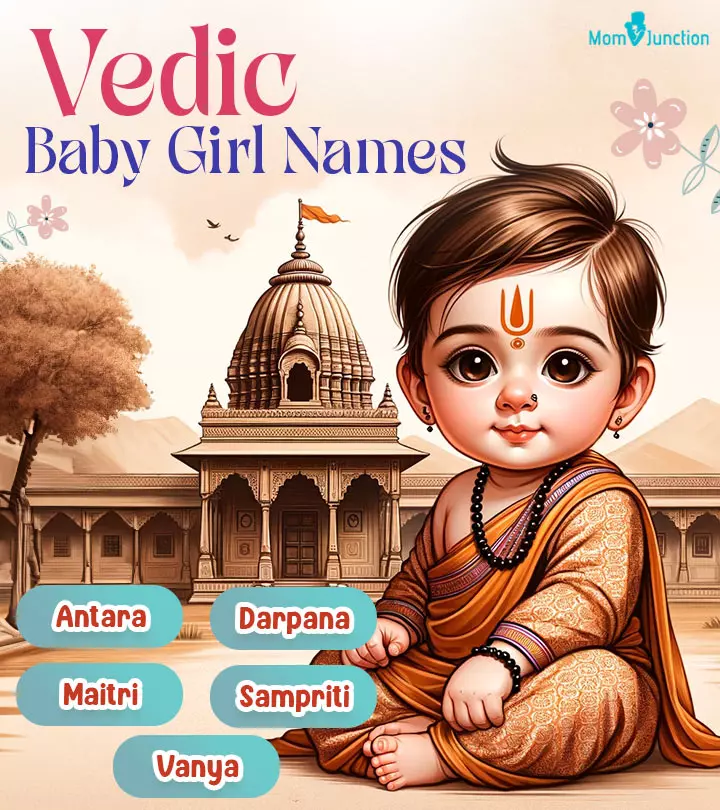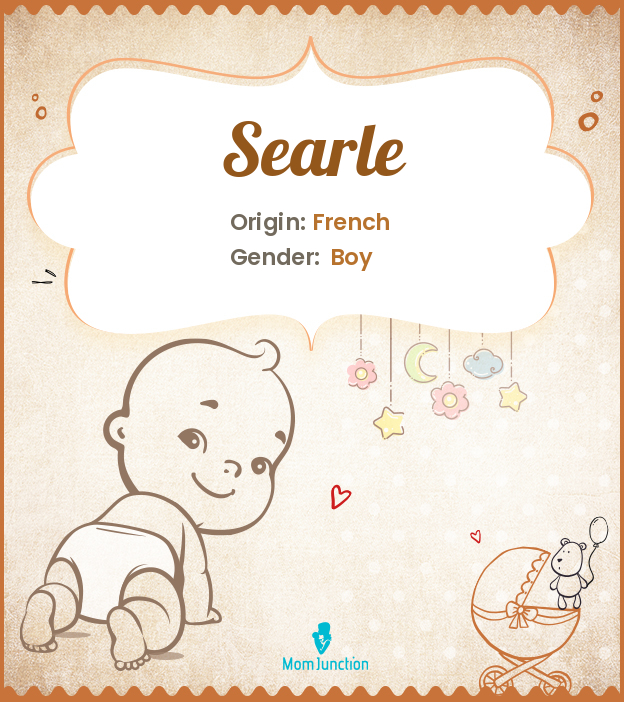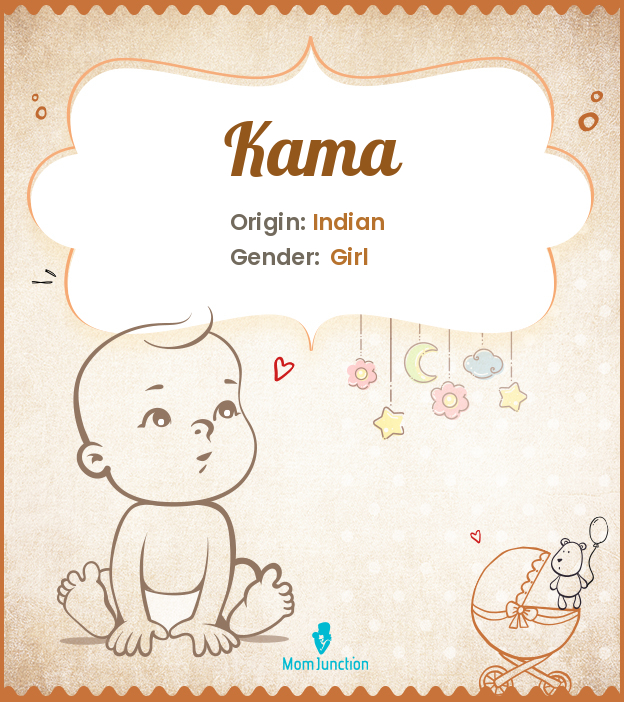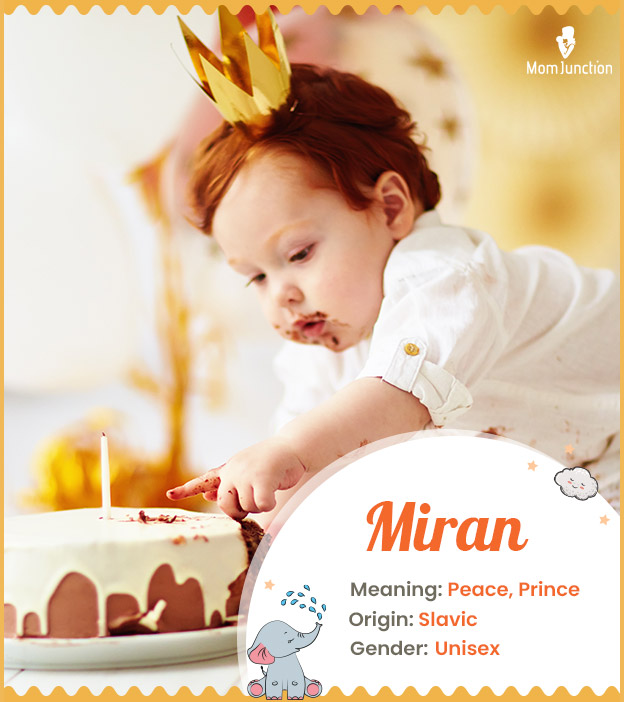
Image: Shutterstock
Gujarat, a culturally rich state in Western India, has been treating us with its unique dance forms and lip-smacking delicacies for centuries. Likewise, its interesting and popular Gujarati surnames continue to impress us. These last names, which make its people stand out from the rest, are rooted in ethnic, topographic, and occupational backgrounds, offering an insight into the community’s history and cultural heritage. They also indicate a person’s social class, where they come from, religious affiliation, and, in some cases, caste status. Such unique aspects show the diversity of Gujarati society. Delve into this list as we share a list of Gujarati last names with meanings.

Key Pointers
- Most Gujarati surnames are derived from Sanskrit or Gujarati language.
- Gujarati surnames have occupational and topographic roots.
- Some of the most common Gujarati surnames include Desai, meaning ‘landlord,’ and Purohit, meaning ‘family priest.’
List Of Gujarati Surnames Or Last Names With Meanings
Gujarati surnames have a lot of historical and cultural importance, and they are usually connected to occupations, castes, and other social groups. For example, the surname Patel is related to landowners, while Shah and Bhatt denote those of the Brahmin caste. Besides these groups, royal dynasties like the Solankis, Rajputs, Marathas, and Mughals have shaped Gujarati last names. Gujarat is not just home to Hindus but also Muslims, Sikhs, Jains, Sindhis, Parsis, and Christians, and their surnames reflect Gujarat’s diverse culture. So, read on to discover the meanings and origins of the most popular Gujarati surnames below.
1. Acharya
Acharya, a common Gujarati surname, derives from ‘Acarya,’ a Sanskrit word for a spiritual leader, or the ‘one who teaches right conduct.’ The surname essentially denotes a teacher.
2. Adhvaryu
The surname originates from a Sanskrit word that means ‘priests participating in Vedic sacrifices’ (1). The surname was most likely an occupational one associated with priests.
3. Ambani
Ambani is a surname associated with the Lohana community. Individuals with the Ambani surname are Bania (Vaishanav), who are associated with trade and business. The most prominent bearers of the surname are the Ambani family, the owners of Reliance Corporation, who are considered India’s and Asia’s most wealthy family (2).
4. Amin
Amin was a knighthood bestowed upon the Hindu Gujarati Patels by the Mughal rulers. Amin (originally the Patidar caste in Gujarat) probably had an occupational origin referring to individuals who worked as tax collectors for the Mughal Empire. The word has Arabic origins and means ‘trustworthy’ or ‘honest.’
5. Amroliwala
The surname is a toponymic one and refers to those who originally belonged to the Amroli region of Surat in Gujarat.
6. Barot
Barot was originally the name of a community that derived itself from the Bhat community. Individuals from the Barot community would usually work as genealogists, historians, and bards. The surname could indicate ‘twelve lips,’ indicating the ability to pronounce words as though one has a dozen mouths.
7. Choksi

The Gujarati surname Choksi derives from the Gujarati word ‘Coksi,’ which means ‘assayer of gold and silver’ or ‘jeweller.’ They generally refer to people from the Bania caste.
8. Chowdhury
The surname Chowdhury is likely a title of honor bestowed by a king to a warrior or a nobleman. Chowdhury or Chaudhary in Sanskrit refers to ‘holder of four,’ where four probably indicated the measure of land granted by the king.
9. Dalal
Dalal derives from the Arabic word ‘dallal’ or ‘aldilal,’ which means an ‘auctioneer.’ The surname Dalal would have been an occupational one for those who worked as traders, brokers, or merchants. A famous bearer of the surname was illustrator and painter Deenanath Dalal (3).
10. Daruwala
Daruwala is a composite of the Gujarati words ‘daru,’ meaning alcohol, and ‘wala,’ which means seller or maker. It was originally an occupational name for someone who produces or sells alcohol.
11. Dave
The surname originates from ‘dvivedi,’ a Sanskrit word referring to ‘one who has studied and mastered two Vedas.’ It is primarily used by Gujarati Brahmins belonging to the Rajgor, Audichya, or Khedaval communities.
12. Desai
Desai is a frequently used Gujarati surname composed of the Sanskrit words ‘desa’ meaning country, and ‘swami’ meaning master or lord. The name Desai, thus, means ‘landlord.’ The surname is famously associated with Indian novelist Anita Desai (4).
 Trivia
Trivia13. Dholakia
Dholakia has an occupational origin and refers to an individual who deals in ‘Dhodka,’ an unprocessed grey cloth. It can also be a habitational surname from Dholka in the Ahmedabad region in Gujarat.
14. Doshi
Doshi is a common Gujarati surname, which means a ‘cloth-selling hawker.’ The surname likely would have been an occupational one. This surname has Persian origins.
15. Gandhi

Gandhi is one of the well-known Indian last names and comes from the Sanskrit word ‘gandha,’ meaning fragrance. Gandhi refers to someone who is a seller of fragrances, that is, a ‘perfume seller.’ This surname is synonymous with Mahatma Gandhi or M. K. Gandhi, the Indian freedom fighter, politician, and lawyer (5).
16. Gajjar
The surname Gajjar represents a Gujarati sub-caste from the Suthar community, who worked in carpentry. This ties in with the meaning of Gajjar, a word with Sanskrit roots meaning ‘measuring tape’ and ‘keeper,’ associating the bearers with civil engineering.
17. Ganjawala
The exact meaning of the Ganjawala surname is unknown. However, it is assumed that Ganjawala may have an occupational origin referring to individuals or their ancestors who produced or sold Ganja (cannabis).
18. Gupta
Gupta is a common Gujarati surname that derives its name from ‘Gupt,’ a Sanskrit word meaning, ‘protected or secret.’ It is also used as a Bengali surname.
19. Hathiwala
The surname is probably derived from the word ‘Hathi,’ which means elephant. Thus, Hathiwala could mean someone who looks after or trains elephants.
20. Jain
It is quite a common Gujarati surname, and indicates that the person is a believer of Jainism. The word Jain comes from the Sanskrit word ‘jina,’ which means ‘victory.’
21. Jariwala/Zariwala
The Gujarati surname probably derives its name from the word ‘Jari/Zari,’ which refers to the shining gold and silver threads used in Indian apparel. The surname Jariwala or Zariwala probably refers to someone who produces and sells jari/zari.
22. Joshi
Joshi derives its name from ‘Jyotisha,’ a Sanskrit word that means an ‘astrologer.’ It is also a common Marathi surname and is mostly used by those belonging to the Brahmin community.
23. Kapadia
A common surname in Gujarat, Kapadia, in Gujarati means, ‘cloth merchant’ or fabric maker.’ It is associated with the Bania subcaste, belonging to Vaishya community.
24. Kothari
Kothari derives its name from the words ‘Kotha’ or ‘Kothar,’ which means ‘treasury’ or ‘godown.’ The surname thus refers to a ‘treasurer’ or ‘store keeper.’
25. Kotadiya
The surname is a toponymic one, and refers to those who originally belonged to the village of Kotadiya, in Jamnagar district of Gujarat.
26. Kotecha
Kotecha is likely an occupational surname referring to a business community whose ancestors were merchants. Bearers of this surname mostly belong to the Lohana subcaste.
27. Lakhani
The surname Lakhani means ‘descendant of Lakh.’ The word ‘Lakh’ comes from ‘Laksmana,’ a Sanskrit word which means, ‘one who has auspicious marks.’ Lakhani is also a common surname among Sindhis.
28. Mehta
Mehta comes from the Sanskrit word ‘mahita’ which means ‘great’ or ‘praised.’ It can also be used to indicate a ‘chief,’ but it was commonly associated with teachers and accountants.
29. Mistry

The surname likely comes from the Hindustani word ‘mistri,’ which comes from the Portuguese word ‘mestre,’ meaning an ‘expert or a master.’ Mistri or Mistry is used to refer to a ‘mason’ or any other ‘skilled artisan.’ The surname thus is an occupational one and refers to someone who comes from a family of masons or artisans.
30. Modi
Modi refers to those who came from the community of Bania (Vaishnavas), Kharwas (fishermen), or Lohanas (traders). The surname belongs to the Modh Ghanchi subcaste, originating from Modhera village near Mehsana in Gujarat. Indian politician and Prime Minister Narendra Modi is a well-known bearer of this surname (6).
31. Munim
The surname comes from the Hindustani word ‘Munim’, which refers to the head accountant at a shop, factory, or any other business establishment. The surname thus has an occupational origin. It can also have Arabic origins meaning ‘benefactor.’
32. Ojha
The surname originates from a Hindi word referring to a ‘healer’ or ‘exorcist’ who cures people with supernatural powers. People with this surname generally belong to the Brahmin community.
33. Panchal
This Gujarati surname is considered to have derived from the Hindustani word ‘panch’ meaning ‘five.’ The name Panchal likely referred to those who belonged to any of the five artisanal communities of blacksmiths, goldsmiths, coppersmiths, carpenters, and stonemasons.
34. Pandya
The surname is derived from the Sanskrit word ‘pandit’ that means ‘teacher’ or a ‘scholar.’ More specifically, it refers to someone who is ‘knowledgeable’ or ‘learned.’
 Trivia
Trivia35. Parekh/Parikh
Parekh derives from the Sanskrit word ‘pariksaka,’ meaning an ‘assayer’ or ‘examiner.’ In Gujarat, the surname likely referred to those who worked as an assayer of gold, silver, and other precious items.
36. Patel
Patel comes from the word ‘Patlikh,’ which was a title given by the king to someone who worked as a record keeper of crops and taxes from a piece of land. The surname ‘Patlikh’ evolved into Patel to denote a village chief or the headman of a village. Prominent freedom fighter Sardar Vallabhbhai Patel was a renowned bearer of this surname (7).
37. Popat
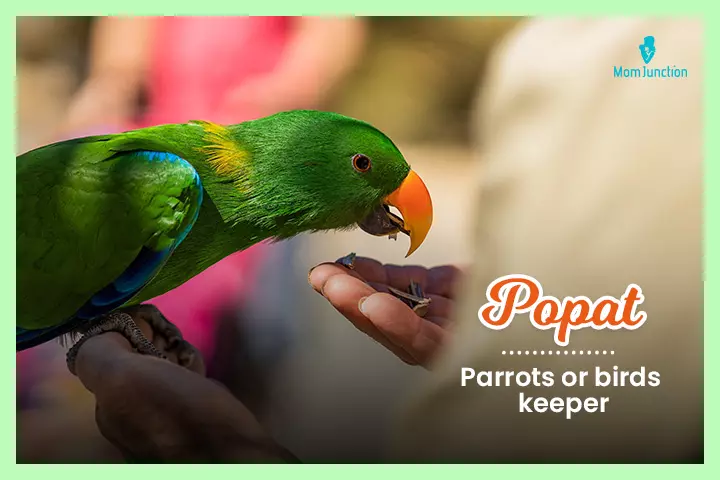
It is the Gujarati word for a ‘parrot.’ The surname may have been associated with those who loved parrots or someone who took care of parrots or birds, in general.
38. Purohit
Purohit, a Brahmin surname, means a ‘family priest’ or a priest who always stays at the forefront of a pooja (a prayer ritual). The surname refers to those who came from a family of ‘Purohits.’
39. Raval/Rawal
Rawal/Raval originates from the Sanskrit word ‘Raja,’ meaning ‘king.’ Thus, Rawal/Raval refers to those who originally came from a family of commanders or kings. Painter and art critic Ravishankar Raval was a famous bearer of this surname (8).
40. Rubberwala
The exact meaning of the surname is unknown. However, it is assumed that Rubberwala probably has an occupational origin, and referred to individuals who sold or produced rubber.
41. Sarabhai
It is assumed the surname Sarabhai was a title for a nobleman or noblewoman. The surname is likely composed of the Gujarati words ‘sara,’ meaning ‘good,’ and ‘bhai,’ referring to a ‘brother,’ ‘man,’ or any other person of significance. Indian astrophysicist and pioneer figure in India’s space program, Dr. Vikram Sarabhai, was a prominent bearer of this surname (9).
42. Sanghavi/Sanghvi
Sanghvi derives its name from ‘sangha,’ a Sanskrit word that means ‘assembly.’ The surname ‘Sanghvi’ likely refers to ‘someone who offers hospitality to Jain pilgrims.’
43. Screwvala
Screwvala probably is a combination of the words screw and ‘wala,’ meaning ‘seller or maker.’ Therefore, the surname refers to someone who likely made or sold screws, making it an occupational surname.
44. Shah
Shah derives its name from ‘sahukaar,’ a Gujarati word that means merchant, banker, or money-lender. The surname thus has an occupational origin.
45. Sheth
It comes from the Gujarati word ‘sheth’ or ‘seth,’ which means master, chief, or the head. It is an occupational surname that refers to someone who works as a ‘supervisor’ or a ‘proprietor,’ and even as a ‘banker’ or ‘head of a guild.’
46. Shroff
Shroff is derived from ‘sarraf,’ an Arabic word that means ‘money-changer.’ This Gujarati surname is mostly associated with a ‘bullion merchant,’ referring to a banker, cashier, or a money-lender. The surname thus has an occupational origin.
47. Thakkar
Thakkar is likely derived from the word ‘Thakkura,’ a Middle Indo-Aryan or Sanskrit word, which means ‘God’ or ‘deity.’ The surname is also spelled as Thakker.
48. Tripathi
Tripathi originates from ‘tripa,’ a Sanskrit word referring to the ‘one who has studied the three Vedas.’ This surname is associated with the Brahmin community and its variants are Tripathy, Tewari, and Tiwari.
49. Virani
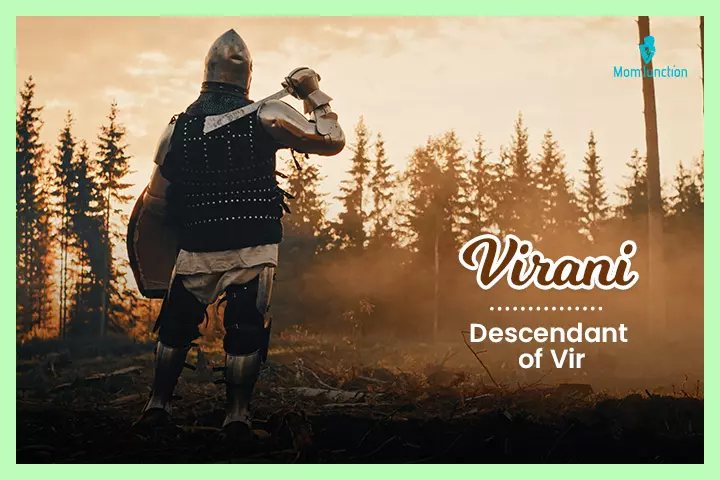
A common Gujarati and Sindhi surname, Virani means ‘descendant of Vir.’ The word ‘Vir’ derives from the Sanskrit word ‘Vira,’ meaning a hero.
50. Vyas
A surname comes from the Sanskrit word ‘vyasa’ meaning the ‘compiler.’ The surname Vyas or Vyasa would have been associated with those who worked as compilers of ancient texts. Krishna Dvaipyayana Vyasa was a revered Hindu sage credited with compiling the Bhagavad Gita and authoring the epic Mahabharata (10).
Gujaratis are best known for their success in the field of business. Many of the popular Gujarati surnames trace their roots to the occupations or businesses held by the original bearers of the surname. For example, Gandhi refers to one who deals in fragrances. Other examples are Daruwala, Doshi, Zariwala, and Screwala. Some last names such as Acharya, Desai, Gupta, Joshi, Mehta, and Pandya are derived from Sanskrit words. Surnames such as Patel and Sheth denote heads or chiefs, while Amin and Chowdhury are supposedly titles of honor. Learning about these surnames will help you understand and relate to Gujarati identities and the importance of their trades. Although many surnames have been modernized today, they represent the diverse background of Gujarat, each with a unique story to tell.
Discover More Names
When you have to choose a name for your baby, a few hundreds of names may not be just enough. Keep digging our mine of baby names until you find that one precious gem.
Frequently Asked Questions
1. How are Gujarati surnames traditionally passed down through families?
Gujarati surnames are usually passed down through different generations of the family based on the patrilineal system, which means that the father’s surname is passed on to his children.
2. Have there been any changes in the popularity or usage of Gujarati surnames over time?
Yes, the popularity and usage of Gujarati surnames have changed significantly over the years due to changes in social, linguistic, and cultural trends.
3. How do Gujarati surnames differ from surnames used in other parts of India?
Most communities in India use the patrilineal system for assigning surnames to children. Hence, Gujarati surnames, which follow the same system, do not differ from others.
4. What is the significance of surnames in Gujarati culture?
Surnames in Gujarat usually are assigned according to the person’s occupation or characteristics. In earlier times, surnames were used to recognize a person’s occupation or standing in society. However, in modern times, Gujarati surnames trace a family’s history.
5. What are some examples of Gujarati surnames that are also used in other parts of India?
Gujarati surnames like Chaudhari/Chaudhary, Gupta, Jain, Joshi, Kumar, and Sharma are used in other parts of India like Maharashtra, Andhra Pradesh, Telangana, Karnataka, Punjab, Assam, Bengal, and Uttar Pradesh.
6. How do Gujarati surnames influence marriage and matchmaking in the community?
Gujarati surnames help determine the occupation and standing of the families of the prospective bride and groom. Those with similar surnames might be relatives and thus, the marriage between the same family is avoided.
7. Are there any famous Gujarati surnames that have become synonymous with a particular profession or business?
Ambani is one of the most famous surnames that has become synonymous with wealth and prosperity, thanks to the contributions of Dhirubhai Ambani, who founded the Reliance Group of Industries. Moreover, Modi has been popularized by the Indian Prime Minister, Narendra Modi. His associate, Amit Shah, also has a Gujarati surname.
8. What role do surnames play in the identity formation of Gujarati individuals and communities?
Surnames help Gujaratis identify the caste, community, place, and profession, thus forging a sense of belonging. Moreover, surnames are used to identify kinship and build a social network.
9. What factors have influenced the evolution of Gujarati surnames over time?
Numerous factors, such as migration to other countries, language changes, social and economic changes, and the influence of new naming conventions, have caused Gujarati surnames to evolve.
Infographic: Popular Gujarati Surnames Or Last Names
Most Gujarati surnames or last names have an ancestral origin, and some are derived from the Sanskrit language and have a peculiar significance. This infographic documents some well-known Gujarati last names derived from the Sanskrit language and their meanings.
Some thing wrong with infographic shortcode. please verify shortcode syntax
References
- Adhvaryu: 15 definitions.
https://www.wisdomlib.org/definition/adhvaryu - The Ambani Family.
https://india.mom-gmr.org/en/owners/individual-owners/detail/owner/owner/show/the-ambani-family/ - Deenanath Dalal a Brief History | Coloring India Foundation.
https://fineartsgurukul.org/deenanath-dalal-a-brief-history-coloring-india-foundation/ - Anita Desai.
https://rsliterature.org/fellows/anita-desai/ - Mohandas Karamchand Gandhi.
https://www5.open.ac.uk/research-projects/making-britain/content/mohandas-karamchand-gandhi - Narendra Modi.
https://www.weforum.org/people/narendra-modi/ - About Sardar Patel.
https://statueofunityguide.in/about-sardar-patel/ - Ravishankar Raval.
https://lalitkalaacademy.gujarat.gov.in/writereaddata/images/pdf/R-M-Raval.pdf - Dr. Vikram Ambalal Sarabhai.
https://www.nrsc.gov.in/ourfounder?language_content_entity=en - Significance of Krishna-Dvaipayana Vyasa.
https://www.wisdomlib.org/concept/krishna-dvaipayana-vyasa
Community Experiences
Join the conversation and become a part of our nurturing community! Share your stories, experiences, and insights to connect with fellow parents.
Read full bio of Rajni Chhabra
Read full bio of Madhurima Biswas
Read full bio of Shikha Thakur
Read full bio of Anindita Ghatak











